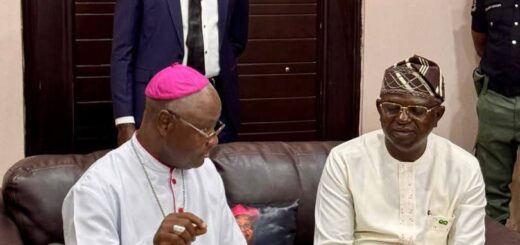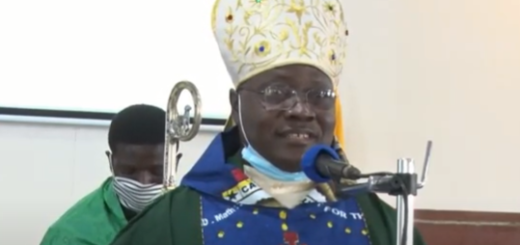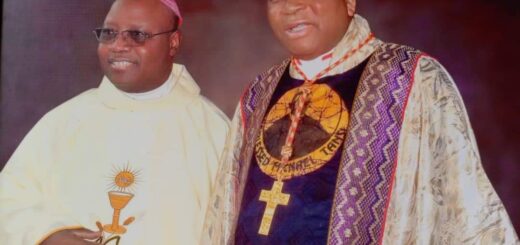Palm Sunday
by ARCH BISHOP · March 28, 2021
Homily by Archbishop Ignatius A. Kaigama, March 28, 2021, Holy Trinity Church, Maitama, Abuja
Readings: Mk. 11:1-10; Is. 50:4-7; Ps. 21(22):8-9, 17-20, 23-24; Phil. 2:6-11; Mk. 14:1-15, 47
The Holy Week which is the peak of our Lenten observance begins today. We are called to journey with Jesus as He makes His way to Jerusalem and then to Calvary, where He will pay the supreme sacrifice to save us from our sins and the sins of the whole world.
Together with His apostles, Jesus entered Jerusalem to celebrate the feast of the Passover, riding on a donkey, to fulfill the prophecy of Zechariah, “behold, your king is coming to you, humble, and mounted on an ass…” (Zech. 9:9). The donkey was commonly used by rural dwellers and farmers. Note that this particular donkey did not even belong to Jesus but was a borrowed one.
St. Paul focuses on the humility of Jesus who, “though was in the form of God, did not regard equality with God … but emptied himself, taking the form of a slave” (Phil 2:6-7). The first reading from Prophet Isaiah is about the Suffering and victorious Servant (cf. Is. 52:13). We see that selfless Servant in the person of Jesus Christ.
In the Gospel we read about the chief priests and scribes plotting to arrest Jesus and to put Him to death. What began at the procession with palms is now heading towards a humiliating and painful death.
The passion narrative outlines some important symbols: the palms, the donkey and the crowd. The palms represent the royalty of Christ and His peaceful reign. The use of a donkey shows Christ’s humility. A fable tells of the donkey that carried Jesus. When the donkey saw the tumultuous welcome of the crowd, it thought the great welcome was for it. After dropping Jesus in Jerusalem, the donkey decided to have a repeat experience of the heroic welcome and went back on the same way, but only to suffer a severe beating by the crowd]. The honour was for Jesus, not the donkey. The honour people give to leaders is because of the power invested in them by the people. If leaders are not humble, they begin to be inaccessible to the poor masses by whose account they (leaders) got their positions.
The same crowd that sang “hosanna” later shouted “crucify him”. There should be a lesson for some leaders who promote political, religious and ethnic violence that the behaviour of thugs they use is unpredictable. Today, they are with you but when economic conditions or political loyalty change, they can turn against you and violently too.
The palms we carry today make us not merely spectators but active participants in the Holy Week; a sign that we are willing to march with Jesus not only in moments of triumph as when He entered Jerusalem, but also in moments of suffering and agony as when He was condemned to death. It is easy to praise God when everything seems to be going well; when we attain success or feel healthy and surrounded by a loving family or good friends, but when we face repeated failure, sickness and pain or abandoned, we find trusting in God difficult. But it is precisely at such moments that we can really participate in the passion of Christ.
There are some lessons for us leaders on this Palm Sunday. Jesus led by personal example, providing basic needs such as bread, water and healing for the sick. Even though aware of the dangers of going to Jerusalem, He still went and suffered indignities, leading to death to win life for the people. For the sake of their people, leaders must be prepared to even take risks injurious to their (leaders) interests and not merely regard their people as objects of exploitation.
Leaders in Nigeria must be discerning about negative religious sentiments that lead to hostility and polarization. We seem to dwell more on the externals of religion and issues that heighten unnecessary competition and tension. Many believers from our religious traditions can qualify like the Pharisee in Luke 18:11-12 who prayed, “God I thank you that I am not like other people: thieves, rogues, adulterers… I fast twice a week; I give a tenth of all my income….”
We spend billions of Naira on pilgrimages and the construction of places of worship in prime areas, but worry very little about what fosters peace and harmony. We seem to be always finger-pointing, intolerant, insensitive and too short-sighted to see the good in the others.
In metaphysics we talk of substance and accident. When it comes to religion in Nigeria, we fail to distinguish between substance and accident. Unnecessary tensions build between Muslims and Christians and even within the same religious tradition of Protestants, Pentecostals and Catholics or Islamic Sect members who directly or indirectly malign or antagonize one another.
Our religious pettiness culminating in needless quarrels and tensions is sometimes spearheaded surprisingly by intelligent and well exposed Nigerians, and even some leaders in government. Rather than building a “paradise” called Nigeria, we argue more about religious superiority and do very little about improving social infrastructure, quality of education, health-care, etc. Some religious leaders complicate issues by their unhelpful statements that polarize and antagonize. We seem to forget that the hood does not make the monk, neither does the garb make the imam. It is such a pity that we have become so religiously hypersensitive that we often turn political, social and justice issues into competition about religious domination.
Please, pray that Nigerians will learn the disposition of humility, the self giving and unconditional love of Jesus, so that we can witness more peace and progress in our beloved country, waiting to lead the world, someday, somehow.
Jesus, have mercy on us and on Nigeria.




